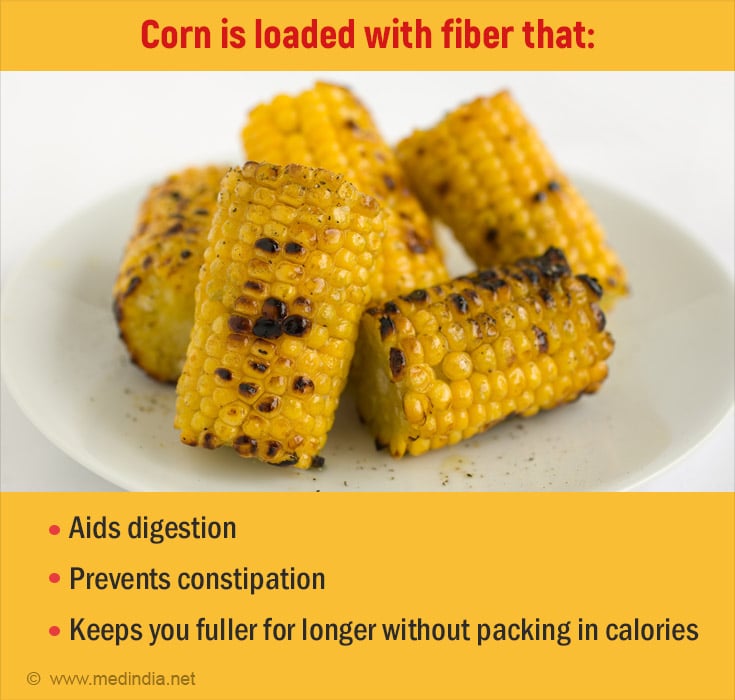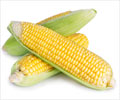- Health Benefits of Corn - (https://www.hopkinsmedicine.org/health/wellness-and-prevention/health-benefits-of-corn)
About
Corn offers various health benefits when consumed alone, and corn-based items can also be included in a healthful diet. It can be used in a variety of meals, including soups, salads, snacks, and desserts.
Corn tortillas are a Mexican cuisine staple that, when coupled with vegetables and protein, can provide a well-balanced lunch. Kids enjoy corn-based cereals, and those with less added sugar may make a quick breakfast or snack with milk, yogurt, or fruit.
It is important to read labels on processed foods manufactured with corn because extra substances influence the nutritional profile. Be wary of foods that have too much-added sugar, salt, saturated or trans fats (1✔ ✔Trusted Source
Health Benefits of Corn
Go to source).
Did You Know?
Each corn kernel has an outer coating of insoluble fiber that stays intact through digestion and supports gut health. #corn #corntortillas
Is Corn a Vegetable or Grain?
Corn can be consumed as either a grain or a starchy vegetable. When we advise our patients with type 1 and type 2 diabetes, we explain that maize is a carbohydrate.
In Latin culture, corn is considered a grain. It is picked once fully grown, dried, and crushed into flour for tortillas. Americans of European heritage, on the other hand, prefer to pick corn while the kernel is soft and juicy and serve it as a vegetable, steamed, fried, or roasted.
Hominy is a food produced from dried field corn kernels steeped in an alkaline solution and properly washed. Hominy can be turned into grits (a famous meal in the Southern United States) or masa for Latin American cuisine.
Nutritional Profile of Corn
Low Calories and Low Fat
A medium ear of sweet corn or a half cup of fresh, frozen, or canned kernels (no extra sugar or salt) has approximately 77 to 100 calories. It is naturally gluten-free and minimal in fat, including only roughly one gram per ear (excluding butter and other greasy toppings). The majority of that gram of fat is polyunsaturated, which can help lower cholesterol and inflammation.
Macronutrients, Vitamins, Minerals, and Antioxidants
The same medium ear of sweet corn or a half cup of fresh, frozen, or canned kernels (without added sugar or salt) contains (1✔ ✔Trusted Source
Health Benefits of Corn
Go to source):
- Approximately 3 grams of protein.
- 5 milligrams of salt and 244 international units of vitamin A.
- About 15 grams of carbohydrates, including around 5 grams of sugar.
- Contains small amounts of B vitamins, magnesium, and potassium.
- Antioxidants, such as Vitamin C, help prevent cell damage.
- Lutein and zeaxanthin promote vision and eye health.
Corn is High in Fiber
Corn contains a high fiber content, both soluble and insoluble. Corn's soluble fiber breaks down and produces a gel in the intestines, which can help manage cholesterol. Soluble corn fiber is utilized in the production of processed foods.
The coating on each delicious kernel of maize is insoluble. This is the undigestible type that the body cannot break down and goes through the body relatively intact, adding bulk to bowel movements and relieving constipation. Corn's insoluble fiber also serves as a prebiotic, feeding and promoting the growth of beneficial intestinal bacteria.

Health Benefits of Corn
Rich in essential vitamins
Corn is high in vital nutrients such as thiamine, folate, magnesium, iron, and potassium. These nutrients support energy, the synthesis of red blood cells, and overall health.
Balances the blood sugar level
Corn includes dietary fiber, which inhibits glucose absorption and prevents blood sugar spikes.
Can be added to a weight loss routine
Corn is low in calories but high in fibre, which helps you feel fuller for longer, reducing overall calorie consumption and thus aiding weight management.
Immunity booster
Corn is high in vitamin C, which boosts immunity and protects cells from oxidative stress.
Supports heart health
Corn fibre and phytonutrients may help lower low-density lipoprotein (LDL or bad cholesterol) and improve blood lipid profiles, so promoting cardiovascular health.
Improves eye health
Corn includes lutein and zeaxanthin, two antioxidants known to protect the eyes from oxidative stress, lowering the incidence of age-related macular degeneration and cataracts.
Gluten-free meal choice
Corn is naturally gluten-free, making it an excellent source of carbohydrates for anyone with celiac disease or gluten intolerance.
Rich in antioxidants and anti-inflammatory substances
Corn antioxidants, such as ferulic acid and anthocyanins in purple corn, fight free radicals, perhaps lowering inflammation and protecting against chronic diseases.
Aids digestion
Corn is high in dietary fiber, which aids digestion and prevents constipation.
Improves energy
Corn is high in carbs, which provide a quick burst of energy and keep it going for a long period, making it great for athletes and those who are extremely active.









